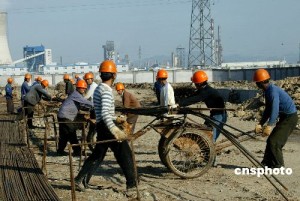Beijing Launches Pilot Program to Reform
 Beijing has become the latest and largest city to join in on reforms to China’s housing registration system, commonly known as hukou. Simply put, the housing system places Chinese citizens into two categories: urban residents and rural residents. However, on February 4th, The National Development and Reform Commission, China’s economic planning department, announced that it was putting in place a pilot program in Tong Zhou, a district in eastern Beijing, to reform the hukou system in the capital. The program will offer points to rural migrants who meet certain criteria in their employment, housing, and duration of residency. Once migrants obtain a certain amount of points not yet disclosed by the Commission, they will be able to trade in their rural migrant status for an urban one, thus increasing their access to various government benefits. This announcement follows six months of gradual reform to the hukou system, for which the Chinese government is still under heavy criticism.
Beijing has become the latest and largest city to join in on reforms to China’s housing registration system, commonly known as hukou. Simply put, the housing system places Chinese citizens into two categories: urban residents and rural residents. However, on February 4th, The National Development and Reform Commission, China’s economic planning department, announced that it was putting in place a pilot program in Tong Zhou, a district in eastern Beijing, to reform the hukou system in the capital. The program will offer points to rural migrants who meet certain criteria in their employment, housing, and duration of residency. Once migrants obtain a certain amount of points not yet disclosed by the Commission, they will be able to trade in their rural migrant status for an urban one, thus increasing their access to various government benefits. This announcement follows six months of gradual reform to the hukou system, for which the Chinese government is still under heavy criticism.
When the housing registration system was implemented in the 1950’s under Mao Zedong on the eve of the Cultural Revolution, it focused more on distinguishing farmers from the rest of the population of non-agricultural workers and controlling the populations of urban regions. Today, however, hukou status is defined more by place of residence, with urban status privileged over rural status. Criticized by many as outdated and even called an apartheid that discriminates not between domestic citizens and international immigrants but rather between citizens of one same country, the hukou classification creates socio-economic barriers between migrants from rural regions and urbanites. It limits migrants’ access to healthcare, education and housing benefits as well as opportunities for employment.
Chinese Premier Xi Jinping announced in July 2014 that the government would be reforming the hukou system and as part of its efforts to boost controlled and sustainable urbanization. To that end, all barriers for migrant workers to register as urban citizens in small cities (defined as cities with a population of less than one million) were removed; this leaves no limits on the amounts of migrant workers that could register for resident status in these cities. This specific change aimed to push rural migrants towards smaller-sized cities, which is beneficial for two main reasons. First, it will promote decentralization, as smaller cities will need to serve more political and economic functions in order to attract migrants. It will also relieve the demographic pressure from larger cities like Beijing and Shanghai, which traditionally have attracted the most migrant workers, and fill smaller cities before migrants can have a chance to get a resident permit in China’s megacities.
Indeed, it became clear that reform was the only viable option specifically in Beijing over the course of the last few months. With a population of more than 20 million people including almost 500,000 rural hukou, the Chinese government feared that over the coming years Beijing might suffer from overcrowding. Although traditionally the hukou system has prevented slums from existing because it prohibits migrants from settling, overcrowding has resulted in the formation of slums in other Asian megacities. In addition, because migrants with rural hukou status don’t have access to the public school system within China’s cities, many have formed their own makeshift schools. In recent months, however, Chinese authorities disbanded many of these schools. Although they guaranteed that the affected students would be placed into the local public school system, the closings fueled conversations about the need to offer basic educational benefits to all citizens, regardless of hukou status.
The choice of the Tong Zhou neighborhood of Beijing to launch the program also somewhat reflects the concern about urban planning and the formation of slums. Tong Zhou includes the Eastern outskirts of Beijing; it is considered to be a main point of entry for rural migrants entering Beijing and is also where many of them reside. Thus, a large portion of Beijing’s current migrant population will be able to benefit from the points system and potentially gain urban hukou status. By these means, Beijing has managed to keep its borders closed to new migrants while at the same time attempting to integrate the rural hukou that already live in the capital. The reform could potentially help many migrants obtain health, education, and permanent housing benefits while preventing more overcrowding. That said, income inequality between urban and rural citizens remains high, and migrants won’t be integrated overnight - only time will tell if promises of equality turn into reality.
